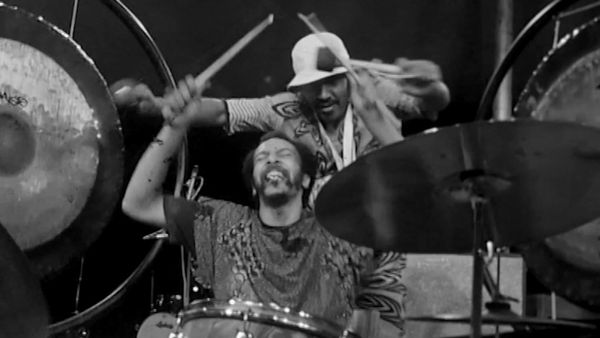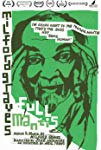Eye For Film >> Movies >> Milford Graves Full Mantis (2018) Film Review
Milford Graves Full Mantis
Reviewed by: Jennie Kermode

How does one tell the story of a man like Milford Graves, who has been shaking up the music world for more than half a century and even today remains difficult to define? The answer is twofold. Firstly, one lets him speak for himself. Secondly, one recognises that, like his art, it has to be freeform.
Structuring a film like this, even at the editing stage, is quite a challenge. it has been compiled using archive footage - much of it taken directly from past lectures and interviews - structured around a master interview which takes place in the musician's garden. A student of his for some years, director Jake Meginsky is better placed to interpret his meandering thought processes than most, but still seems blindsided on occasion. In one scene Graves, talking about cosmic energy and the importance of recognising one's relationship with the universe, suddenly bends down and eats a leaf right down the the ground in four swift bites, then beckons to the unseen Meginsky to do likewise. A small movement of the camera is enough to tell us that the student is not yet fully ready to embrace all that he professes to admire.

Graves does these things with a twinkle in his eye that keeps the viewer guessing as to just how serious he is, but we never get the sense that he's misleading us about his beliefs, merely testing to see if we're with him. Dreamer and polymath, a man whose achievements in medicine as well as music should instantly dismiss any speculation that he's spouting empty fantasy, he has a passion for radically reanalysing systems, trying to understand the world in different ways through observation. It's built on a wariness of received wisdom that might change little by little each time it's passed along. There's a reason he bought praying mantises and is now locally renowned as a teacher of martial arts. For him, everything goes back to nature and to observation. Meginsky tries to show us the world through his eyes, drifting deliberately in and out of focus as he explores the visual metaphors and sources of inspiration in the flowers and foliage that surround them.
Graves' house looks not unlike a garden. Half-finished mosaics straddle its outer walls, a creative project from his younger days. Inside, a tangle of artefacts provides testimony to his passion for cultural fusion and for tracing ideas from different cultures back to their source. New York City is the perfect place for all this; Graves has embraced the famous melting pot like no-one else. In between sections of conversation (and sometimes, less helpfully, during them), Meginsky lets the ambient sound of traffic swell, reminding us of the presence of the city itself, of its own strange nature. Sometimes Graves discourses on his explorations of the city, of its people; and, in one case, of a dangerous encounter with a neighbour who endangered the life of his son.
We hear little about Graves' family; they're just a detail in a story focused on his creative output and the intellectual journey behind it. There's also relatively little about the nuts and bolts of his career. When it does come up, the focus is not on famous performances or the people he's played with, but on the moments that have influenced him. He talks at length about the way a group of Japanese autistic children responded to a performance he gave, and seems to have learned as much from the encounter as they did. He also demonstrates the way that nature and medicine have fed into his music; we see the equipment he uses to record the heart sounds of every visitor to his house.
Then, of course, there's the music itself, the complex, sometimes deliberately broken rhythms of Graves' percussion rising up to take control of the narrative. Sometimes allowed to dominates for minutes at a time, they are always fascinating because we never know where they're going to take us. Again, there's that twinkling of the eye, that awareness that a man who handles drumsticks like a juggler has absolute control of something we're only just beginning to understand.
There's much here that's fascinating, whether you're a fan of Graves' work or not. The filmmakers' attempt to reflect his style in their own production isn't entirely successful, perhaps because they are making too many concessions to inherited ideas, but although this keeps it from reaching the heights it might have attained, Full Mantis remains an intriguing portrait of a highly unusual man.
Reviewed on: 11 Jul 2018

















